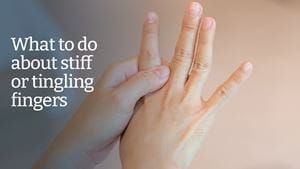
Experiencing tingling, numbness, or stiffness in the fingers is very common in people of all ages—but it can be nerve-wracking if you don’t know why it’s happening.
There are a variety reasons why someone might experience discomfort in their fingers, ranging from injury to neurological disorders.
“Tingling sensations and stiffness in the fingers can be bothersome. Many people describe the feeling that their fingers are ‘falling asleep’ or are difficult to move. The best thing to do is work with an orthopaedic physician to determine what’s causing that,” said Dr. Jonathan Gabel.
Johnathan Gabel, MD, an orthopaedic surgeon with Rochester Regional Health provides advice on what to do if you’re experiencing finger discomfort and why it might be happening.
Difficulty moving fingers or sensations of tingling or numbness can result from a hand injury, such as a fracture, sprain, or injury to a tendon or muscle. In most cases, other symptoms of hand injury include pain, swelling, redness, and/or bruising.
Those with arthritis commonly experience stiffness in their hands and fingers. In general, these symptoms get worse over time and are accompanied by pain, swelling, and difficulty moving other joints.
Also called trigger finger, this occurs when the protective layer around the tendons in the finger becomes inflamed, preventing it from moving as freely as it should. Often, people with stenosing tenosynovitis will notice that their finger snaps into a bent or straight position rather than moving slowly. The finger might also lock in the bent position.
Dupuytren’s contracture, also known as palmar fibromatosis, causes the collagen tissues in the palm to thicken and tighten over time. When this happens, knots in the tissue can pull one or more fingers into a bent position, often affecting the pinkie and ring finger.
The carpal tunnel is a small space in the wrist in which several nerves that control the fingers and hands pass through. Carpal tunnel syndrome occurs when nerves in that space pinch due to irritation or swelling, often as a result of extensive computer work overtime or other overuses of the wrist.
The course of treatment for finger tingling and stiffness largely depends on the cause. However, there are a few options to try at home to relieve discomfort:
If you experience persistent pain, numbness, stiffness, or tingling in your fingers, contact your primary care physician or an orthopaedic specialist who can work with you to determine a proper treatment plan once they diagnose the reason behind your discomfort.
“Finger numbness or stiffness can be a symptom of something that might be affecting many different parts of the body. If you have noticed discomfort in your fingers for a few weeks, be sure to contact a physician."
